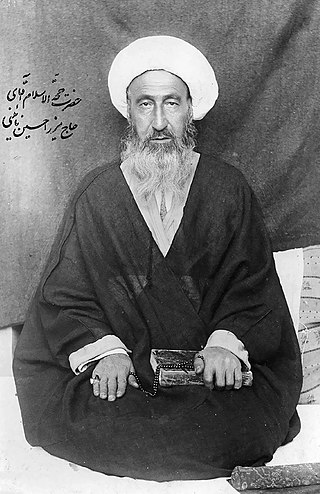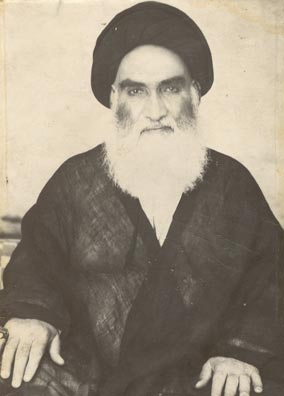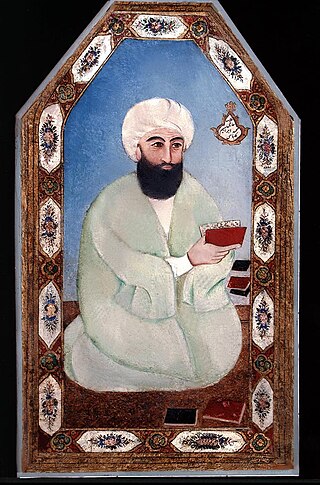Related Research Articles
Grand Ayatollah Sheikh Basheer Hussain Najafi is a Pakistani Twelver Shia Marja' and one of the Four Grand Ayatollahs of Najaf, Iraq. He was born in Jalandhar, a city in then-British India. He resides in Najaf, Iraq now.

Grand Ayatollah Sheikh Hossein Wahid Khorasani is an Iranian author and Shia marja'.

Grand Ayatollah Sayyid Sadiq al-Hussayni al-Shirazi is an Iraqi-Iranian Shia marja'.

Ali Qazi Tabatabai, also known as "Allamah Qadi" and "Ayatollah Qazi", was an Iranian alim and mystic. He was the son of Husseyn and was born in Tabriz, Iran. He was born on 29 April 1866 in Tabriz. His father Sayyed Hosein Qazi was a prominent pupil of the grand Mirza Shirazi. His maternal grandfather, Mirza Mohsen, was a great jurist.

Grand Ayatollah Sayyid Mohammad Hadi Milani was an Iranian-Iraqi marja'.

Ayatollah Sayyid Radhi al-Husayni al-Shirazi, also known as Razi Shirazi, was an Iraqi-Iranian Shia who was a jurist, philosopher and theologian. He was the great-grandson of the renowned Shia jurist, Mirza Shirazi, the pioneer of the Tobacco protest. He was the Imam of the Shifa mosque in Yousefabad.

Mirza Mahdi Ashtiani (1888–1952), a man of wisdom, mystic, man of literature, was a Great Master in the philosophical School of Tehran.

Grand Ayatollah Sheikh Mohammad-Hossein Naini Gharavi was Iranian Shia marja'.
Ayatollah Sheikh Muhammad-Jawad al-Balaghi al-Najafi was an Iraqi Shia religious authority, author, poet, and polemicist.

Grand Ayatollah Sheikh Muhammad-Hasan al-Najafi, also known as Sahib al-Jawahir, was a prominent Shiite religious authority and author. He was most known for his books of Jawahir al-Kalam Fi Sharh Shara'i' al-Islam, a 42-volume work on fiqh.

Grand Ayatollah Mirza Mahdi al-Husayni al-Shirazi , also known as Mirza Mahdi al-Shirazi, was an Iraqi-Iranian Shia marja. After the death of Abu al-Hasan al-Esfehani and Hossein Tabatabaei Qomi, Mirza Mahdi was considered to be the highest ranking cleric in Karbala, and one of the highest in Iraq, along with Muhsin al-Hakim and his second cousin once removed, Abd al-Hadi al-Shirazi in Najaf.

Grand Ayatollah Mujaddid Mirza Abu Muhammad Mu'iz al-DinMuhammad-Hassan al-Husayni al-Shirazi, better simply known as Mirza Shirazi, was an Iraqi-Iranian Shia marja'.

Seyyed Abdollah Behbahani was a Shi'a theologian and a prominent leader of the constitutional movement. He was born in Najaf and was educated by scholars such as Morteza Ansari. During the constitutional movement he was influential in the Majlis. On the night of 15 July 1910, four gunmen attacked his house and killed him. Seyyed Hassan Taghizadeh was suspected to be responsible, and he subsequently fled the country.

The Najaf Seminary, also known as the al-Hawza Al-Ilmiyya, is the oldest and one of the most important Shia seminaries (hawza) in the world. It is located near the Imam Ali Shrine in the city of Najaf in Iraq, and also operates a campus in Karbala, Iraq. It was established by Shaykh al-Tusi, and continued as a center of study after the establishment of modern Iraq in 1921.

Ayatollah al-Shaheed Sayyid Abū al-Fatḥ ʿIzz ad-Dīn Naṣrallāh ِal-Fāʾizī al-Mūsawī al-Ḥāʾirī, also known as Sayyid Nasrallah al-Haeri, was a senior Iraqi Shia jurist, teacher, poet, author and annalist.

Grand Ayatollah Sayyid Abd al-A'la al-Musawi al-Sabziwari was an Iranian-Iraqi Shia marja'. He is regarded as one of the most influential grand religious authorities and he was a contemporary of Abu al-Qasim al-Khoei.
Ayatollah Sayyid Muhammad-Kadhim al-Husayni al-Modarresi was an Iranian-Iraqi Shia scholar and mystic. He was a prominent teacher at the seminaries of Mashhad and Karbala, teaching Islamic philosophy. He held the Quranic exegesis chair of the Karbala seminary and taught aqaed in the al-Hindiya and al-Badkubeh schools.

Grand Ayatollah Mirza Abd al-Hadi al-Husayni al-Shirazi was an Iraqi-Iranian Shia marja' and poet. After the death of Abu al-Hasan al-Esfehani, al-Shirazi was considered to be one of the highest ranking scholars in Iraq, along with Muhsin al-Hakim and some less popular jurists like Muhammad-Husayn Kashif al-Ghitaa, Mahmoud al-Shahroudi, and Muhammad-Ridha Al Yasin. His brother-in-law, Mirza Mahdi al-Shirazi was the leading scholar in Karbala.
The family of Kashif al-Ghita, are an Iraqi religious Twelver Shia family that settled in Najaf, in the 13th A.H/19th A.D century.

Grand Ayatollah Sheikh Mohammad Ibrahim al-Karbasi (kalbasi) known as Sahib al-Isharat was a Shia jurist, mujtahid, fundamentalist, Quran commentator, theologian, scholar of biographical evaluation and marja', and considered the reviver of the Isfahan Seminary in the 19th century.
References
- ↑ al-Azzawi, Dr. Fadhil (January 1, 2017). Khafaya al-Mu'amarat al-Duwaliya Li Isqat al-Hukm al-Watani al-Qawmi Fi al-Iraq Munth Ta'sisahu Aam 1921 Wa Lighayat Ihtilalih Aam 2003 [Hidden State Conspiracies To Befall The National Patriotic Governance In Iraq From Its Conception In 1921 Til Its Invasion In 2003] (in Arabic). Al Manhal. p. 34. ISBN 9796500275406.
- ↑ (Hamid Algar, http://www.iranicaonline.org/articles/kasef_al_geta_moh)
- ↑ "Sheikh Muhammad Husayn Kashif al-Ghita". al-Shi'a (in Arabic). November 23, 2014. Retrieved January 15, 2021.
- ↑ (Avaye Bidary ,1372 solar, 12, special edition of jomhoury Islamy newspaper).
- ↑ (modarres Tabrizi, Reyhanat Al Adab, vol:5, p.p.24-26./ Anjavi Nejad Sayyed Mahdi, Biography of Kasef Al Geta,p.118, Islamic studies Magazine, winter 1356 solar, number 25)
- ↑ . (Hamid Algar, http://www.iranicaonline.org/articles/kasef_al_geta_moh)
- ↑ (Anjavi Nejad Sayyed Mahdi, Biography of Kasef Al Geta,p.120, Islamic studies Magazine, winter 1356 solar, number 25)